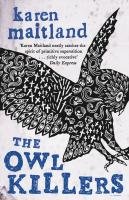Reviewed by celinenyx on
A group of beguines, women who dedicate their lives to charity and religion without making lasting vows, settles in a small village in England called Ulewick. There they are not welcomed by the villagers, who still cling to the their old heathen ways, terrorized by the anonymous Owl Masters.
The Owl Killers is set in the fourteenth century, which is not a very popular choice for historical fiction. Maitland seems to feel really passionate about the middle ages, and it makes my aspiring-historian heart happy to see how she truly captures the day to day life for villagers in the fourteenth century. The way they interact with each other, how they work, the clash of religion and tradition - it all fits. She weaves themes of feminism, abuse, self-determinism and freedom into this setting in a way that feels natural for the time. Instead of enforcing twenty-first century ideals on the setting, she uses the questions that rises from the material itself.
The book is narrated by five characters, and one of the main themes is that of misunderstanding. Maitland uses the multiple points of view to enlighten the character dynamics from different sides, showing how disagreements and emotions are fuelled by ignorance. I really enjoyed this technique. On the other hand, the biggest weakness of the book lies in the characterization. While the characters do all have their own wishes and dreams and fears, somehow they never truly come to life. Maybe the chapters are too short for this, or maybe the technical skill to write life-like characters is absent, but none of them quite jumped off the page.
In a way The Owl Killers asks the reader to fill in the blanks. Not every event is shown from every perspective, and often the point of view that is not shown is a key one. Because of this, this novel is one which gained a life of its own within my subconscious, and I found myself thinking of the book throughout the days I spent reading it, and even some days after.
Reading updates
- Started reading
- 11 September, 2015: Finished reading
- 11 September, 2015: Reviewed
